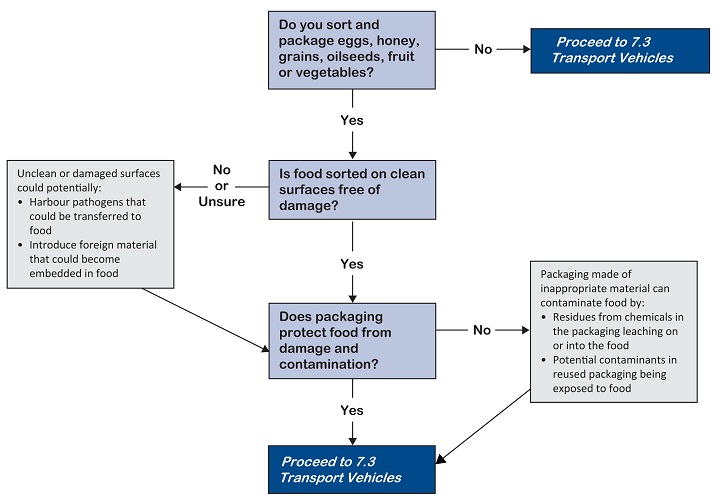Shipping - 7.2 Sorting and packaging
If food is not sorted and packed appropriately, food can become contaminated during storage or shipping.
This good agricultural practice applies to farms that handle eggs, honey, grains, oilseeds, nuts, fruits or vegetables.
What needs to be done
Sort and package food to minimize damage and contamination. Make sure packaging used for food products are made of materials that will protect the safety and quality of the product.
How to do it
- Remove visible foreign material and rotten or damaged product during sorting, and discard or re-direct it where appropriate
- Learn more about the handling of eggs
- Make sure that food is sorted on clean surfaces. Surfaces used for sorting food should be free of cracks or damages where contamination can occur
- When hand-sorting produce that could be consumed raw, wash hands regularly or wear appropriate hand coverings. Learn about hand washing
Choose the right material
Packaging material and containers need to protect the product from external contamination and damage, while providing the necessary environmental conditions to maintain product quality and safety. Learn more about general storage
When ordering packaging materials, ask your suppliers for appropriate materials or refer to Reference Listing of Accepted Construction Materials, Packaging Materials and Non-Food Chemical Products (Canadian Food Inspection Agency).
When selling to direct markets, make sure packaging materials and containers are new and provide enough space to attach a label with adequate documentation (e.g. name and address of producer, lot codes etc.)
Reuse packaging with caution
When reusing packaging, make sure it is:
- Durable
- Cleaned and sanitized
- Stored in an area that is free from contamination and is not accessible to pests or other debris
Do not reuse packages that have contained chemicals or treated seed/feed.
If you have an audit
Be prepared for the auditor to observe that packaging materials:
- Are appropriate for the intended use
- Have the proper information on labels
- Are clean and sanitary prior to use
Laws and regulations
There are few laws that directly impact on food safety regulating the sorting and handling of animals in agricultural production. However, there are laws that prohibit the sale or transport of various food items, and sorting should ensure that these items will not be sold or transported.
Under the Agricultural Produce Grading Act, R.S.B.C. 1996, c. 11, s. 14, the Lieutenant Governor in Council may make regulations to establish a system of grading and marking for any agricultural product, or to respect the examination, grading, packaging, packing, marking, handling, selling, shipping, transporting and advertising of any agricultural product in BC. The Fruit and Vegetable Regulation, Reg. 100/78, s. 6, states no person shall offer, accept, ship, transport, sell or offer for sale any produce that is below the minimum grade for that produce. The Shell Egg Grading Regulation, Reg. 105/78, s. 2-3 prohibit the sale within BC of eggs for human consumption except eggs graded, packed and marked in accordance with this regulation and Canada Agricultural Products Act and the regulations under it with respect to grade.
However, s. 2 (2) allows a producer to sell eggs that are not graded, packed and marked as required, if the eggs are produced on the producer’s own farm, and are sold directly to consumers at the producer’s farm or place of residence. S. 3 (5) provides that the containers and trays in which ungraded eggs are packed for shipment shall be reasonably clean and sound in construction. S. 3(8) states eggs that do not comply with the standards set out in this regulation shall be destroyed or packed in containers bearing the words “Rejects – Not for Human Consumption”. S. 11 (11) specifies no person shall purchase or sell or offer for sale rejects for use as food, or in the preparation of food, for human consumption.
The Food and Drugs Act (Canada) 1985, R.S., c. F?27, s. 4 states no person shall sell an article of food that has in or on it any poisonous or harmful substance; is unfit for human consumption; consists in whole or in part of any filthy, putrid, disgusting, rotten, decomposed or diseased animal or vegetable substance; is adulterated; or was manufactured, prepared, preserved, packaged or stored under unsanitary conditions. The Food and Drugs Act (Canada), 1985, R.S, c. F-27 also specifies authorized packaging materials. Packages need to have room for an appropriate label.
Poster
Sample E: How to wash your hands poster
| Go back to 7.1 Traceability and recall |

